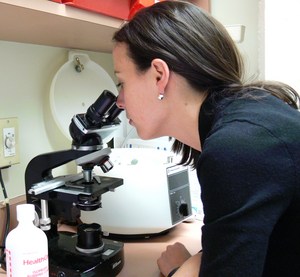



Research in Residency
What is Research?

For some physicians, the idea of research is exciting and for others, it is daunting. As physicians, you will be involved with clinical research to varying degrees throughout your career, including your residency. Research is not just bench science, it can be clinical and and can follow a huge variety of methodologies. Research findings can be translated into clinical practice, improving patient care.
Research is the careful, logical and systematic process of investigation. The research process has many stages including:
Identifying a topic
Searching and Reviewing the Literature
Defining a topic
Stating a general question or problem
Phrasing a hypothesis
Planning a method to test the hypothesis
Collecting the data
Analyzing the data and interpreting the results
Writing about the findings [1]
Many programs require residents to complete a scholarly project as part of their training program. Why? Most training programs feel that it is important for all clinicians (destined to be researchers or not) to have a basic understanding of clinical research. This is because the purpose of clinical research is to improve patient care and health care systems. Therefore it is necessary for all physicians to understand the process and implications of research. Program directors also want to expose residents to research as a career opportunity. Some residents who begin research in their training then go on to continue their interests as life-long researchers.
Planning a research project
Tips for planning a research project:
Do your research! Find out what opportunities are available and figure out what you are interested in?
Do a literature search with your idea in mind.
Look for a mentor who can give you guidance.
Persist...often research questions and ideas change along the way - don’t get discouraged.
Set up a timeline and a goal such as conference presentation, resident’s research day or publication.
Set up regular meetings with your supervisor.
Be patient - a research project requires time and commitment.
Research Ethics for Residents
An often overlooked area in medical education is ethics in clinical research. It may be intuitive that clinical research is conducted for the benefit of patients, but there are always ethical considerations. Why is Research Ethics important?
’Rather fail with honor that succeed by fraud’ - Sophocles
According to Dr. Bernard Lo, author of ’Ethical Issues in Clinical Research - A Practical Guide’, ethical issues cannot be avoided when research is carried out. He states that "a fundamental ethical tension arises in human subjects research because the persons who benefit from research generally are not those who suffer its risks’. He suggests that the ethical principles of respect for persons, beneficence, and justice should guide research with human participation.
Some Key Points:
Informed consent is a requirement of human research, and consent must be also be voluntary.
Conflict of interest could affect objectivity in the interpretation of the results and diminish the trust of the public.
Integrity in research is needed at the level of the individual scientist and the institution.
Integrity in research at the individual level includes: intellectual honesty, accuracy in representing contributions, fairness in peer review, collegiality, sharing of resources, transparency in conflicts of interest, protection of human subjects and the humane care of animals. Integrity in research at the institutional level includes leadership, respect, adherence to rules, management of institutional conflict of interest, investigations of misconduct, education around integrity and monitoring of the institutional environment.[2]
Can research cause harm?
Medical research can be harmful by:
forcing people to participate in invasive research projects
depriving people of information about what is being done to them
depriving sick people of proven therapies in order to test out risky new treatments
using vulnerable populations to test out treatments to benefit other groups
limiting patients’ access to therapy to the time needed to carry out the research trial
providing some participants with lower standards of care
exposing some research subjects to stigma or discrimination in society
excluding some sectors of the population from research that could benenfit them
failure to disclose serious adverse events.[3]
According the CMA Code of Ethics[4], physicians must:
Ensure that any research in which you participate is evaluated both scientifically and ethically and is approved by a research ethics board that meets current standards of practice.
Inform the potential research subject, or proxy, about the purpose of the study, its source of funding, the nature and relative probability of harms and benefits, and the nature of your participation including any compensation.
Before proceeding with the study, obtain the informed consent of the subject, or proxy, and advise prospective subjects that they have the right to decline or withdraw from the study at any time, without prejudice to their ongoing care.
_________________________________
1. Hurley WL, Denegar CR, hertel J. Research methods: a framework for evidence-based clinical practice. Lippincott Williams & Wilkins. 2011.
2. Integrity in Scientific Research: Creating an Environment That Promotes Responsible Conduct, from Institute of Medicine National Research Council of the the National Academies.The National Academies Press. 2002. Available at: www.nap.edu/openbook.php?record_id=10430&page=1 accessed October 1, 2011.
3. The Medical Profession & Human Rights: Handbook for a changing agenda, British Medical Association, Zed Books. 2001.
4. Canadian Medical Association, CMA code of ethics www.cma.ca/index.php?ci_id=53556&la_id=1 accessed October 1, 2011.
 Previous
Previous